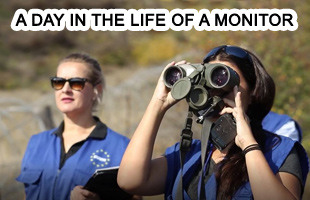On 17 July, the Swedish Foreign Minister Carl Bildt together with Ambassador Per Eklund, Head of the Delegation of the European Commission in Georgia, and Ambassador Peter Semneby, EU Special Representative for the South Caucasus, visited the European Union Monitoring Mission. Sweden currently holds the EU Presidency and therefore led this visit of the Troika.
As the Foreign Ministers of the European Union Member States are about to decide on the extension of the EUMM mandate at the end of this month, Foreign Minister Carl Bildt wanted to get a first hand insight into the work and achievements of EUMM.
The delegation spent the first half of the day with EUMM’s field office in Zugdidi to learn more about the situation in the Abkhaz theatre. The Head of Mission, Ambassador Hansjörg Haber, welcomed the Minister personally at the field office and gave him a presentation on EUMM. He underlined the adaptations that EUMM had undergone over the past ten months to react to the evolving situation on the ground and stressed the need to remain flexible in the future. In this region the recent closure of the UN Mission was of particular significance placing greater responsibilities on EUMM.
The delegation went on an extensive field trip, visiting first the Rhuki bridge and then an IDP collective center where people who had to flee their homes in Abkhazia during the early 90s live.
Later in the day the Troika visited the area close to the Georgian check-point at Odzisi near the South Ossetian administrative boundary line, then the IDP centre at Tseravani, before visiting the EUMM Tbilisi Field Office based in Mtskheta.
Foreign Minister Carl Bildt expressed his satisfaction with the work of the EUMM and made clear that he was confident that the presence of the Mission had led to greater stability in the region. He also thought that EU Foreign Ministers would extend the mandate of the Mission for another year; any further adjustments or additions to the Mission’s workload would be discussed at a later date. There were no plans to give the Mission executive powers or extend its remit to a formal policing role.
As the Foreign Ministers of the European Union Member States are about to decide on the extension of the EUMM mandate at the end of this month, Foreign Minister Carl Bildt wanted to get a first hand insight into the work and achievements of EUMM.
The delegation spent the first half of the day with EUMM’s field office in Zugdidi to learn more about the situation in the Abkhaz theatre. The Head of Mission, Ambassador Hansjörg Haber, welcomed the Minister personally at the field office and gave him a presentation on EUMM. He underlined the adaptations that EUMM had undergone over the past ten months to react to the evolving situation on the ground and stressed the need to remain flexible in the future. In this region the recent closure of the UN Mission was of particular significance placing greater responsibilities on EUMM.
The delegation went on an extensive field trip, visiting first the Rhuki bridge and then an IDP collective center where people who had to flee their homes in Abkhazia during the early 90s live.
Later in the day the Troika visited the area close to the Georgian check-point at Odzisi near the South Ossetian administrative boundary line, then the IDP centre at Tseravani, before visiting the EUMM Tbilisi Field Office based in Mtskheta.
Foreign Minister Carl Bildt expressed his satisfaction with the work of the EUMM and made clear that he was confident that the presence of the Mission had led to greater stability in the region. He also thought that EU Foreign Ministers would extend the mandate of the Mission for another year; any further adjustments or additions to the Mission’s workload would be discussed at a later date. There were no plans to give the Mission executive powers or extend its remit to a formal policing role.
 |
 |
 |
 |
 |
 |
 |
 |


